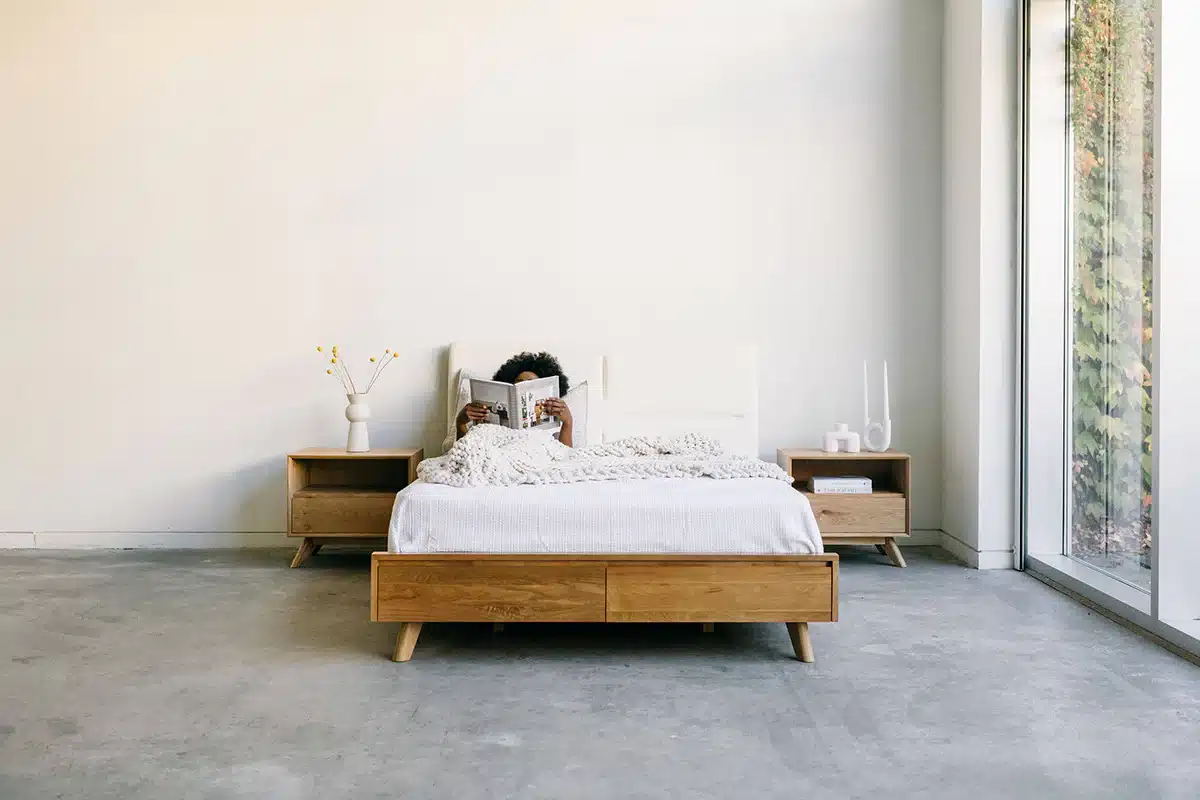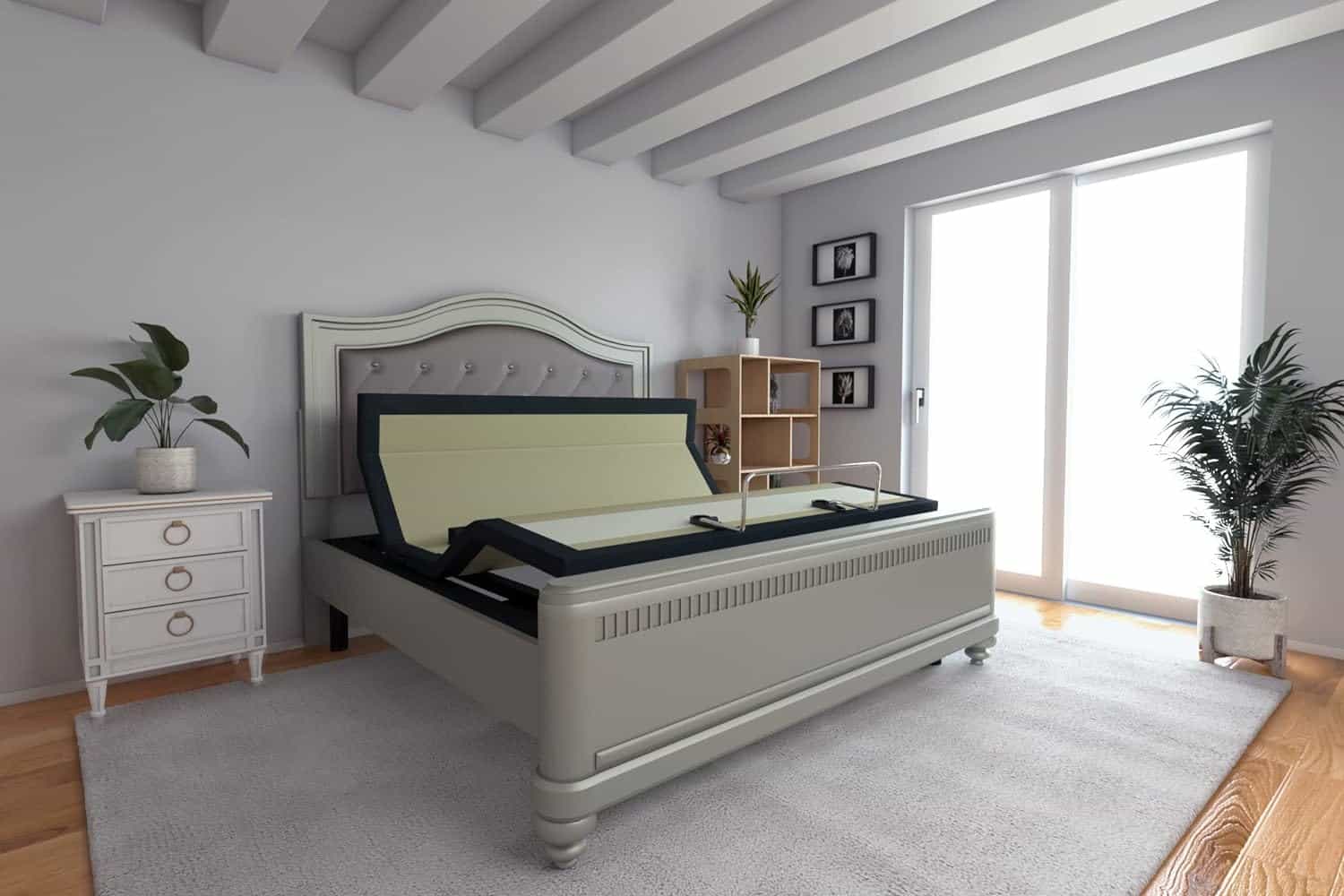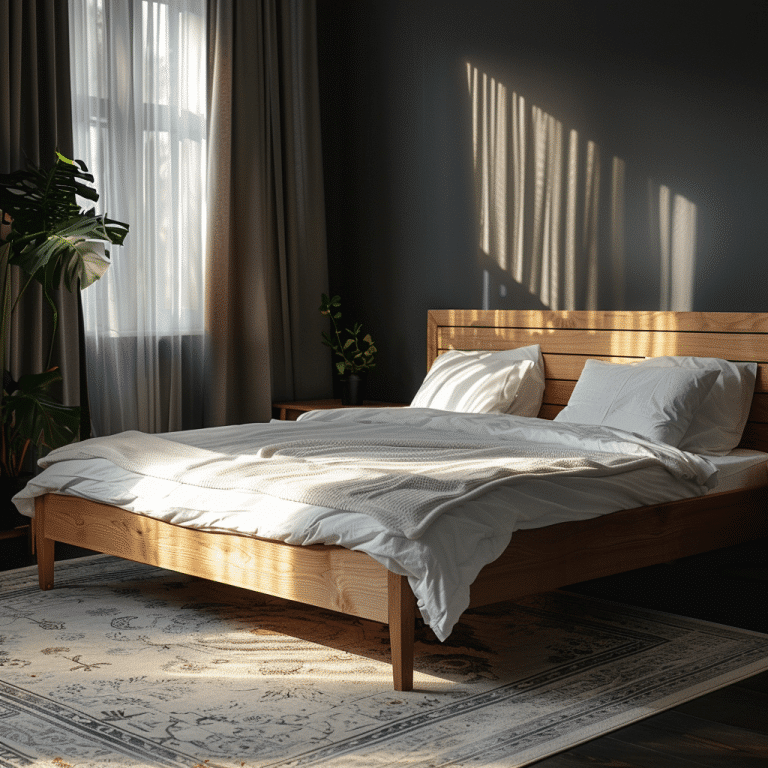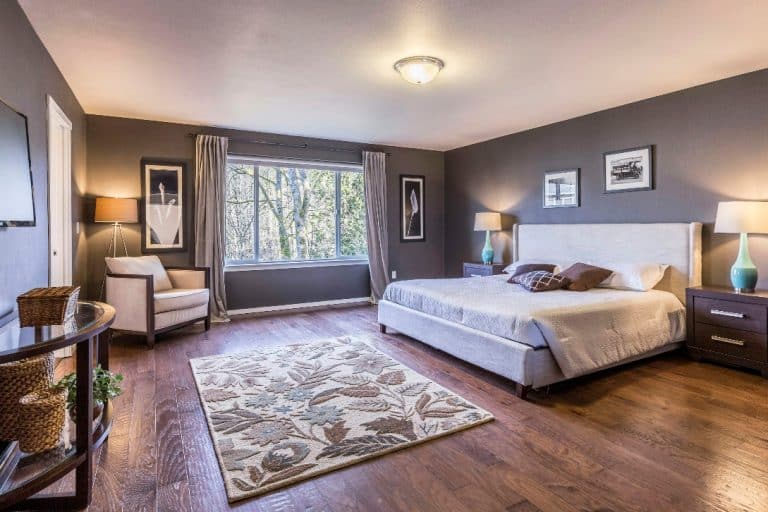Sleep is a crucial component of overall health and well-being, and the quality of sleep you get each night can significantly impact your daily life. While much attention is given to mattresses and pillows when discussing sleep quality, the bed frame also plays a vital role.
The right bed frame not only supports your mattress but also contributes to comfort, stability, and aesthetics, all of which can influence how well you sleep. This article will explore how bed frames affect sleep quality and what to consider when choosing one.
1. Support and Stability
Good bed frames provide a solid foundation for your mattress, ensuring it remains in place and performs optimally. Poorly constructed or flimsy bed frames can lead to uneven support, causing the mattress to sag or shift. This can result in discomfort and improper spinal alignment, leading to aches and pains that disrupt sleep.
A sturdy bed frame, typically made from high-quality materials like solid wood or metal, can enhance the durability and performance of your mattress, promoting better sleep posture and comfort.
2. Noise and Movement Reduction

A well-constructed bed frame minimizes noise and absorbs movement, reducing disturbances caused by shifting or turning during the night. Look for bed frames with secure joints and connections, and consider options with padded or cushioned components to further dampen sound.
3. Height and Accessibility
The height of the bed frame affects both accessibility and comfort. A bed frame that is too low can make it difficult to get in and out of bed, particularly for older adults or those with mobility issues.
Conversely, a frame that is too high can also pose challenges. An ideal bed frame height allows you to sit on the edge of the bed with your feet flat on the floor and your knees at a right angle. This facilitates easier movement and can prevent strain or injury, contributing to better sleep quality by ensuring a comfortable and accessible sleep environment.
4. Aesthetic and Psychological Impact

A bed frame that is unattractive or incongruent with your personal style may contribute to a cluttered or chaotic feeling, which can negatively impact your ability to unwind and fall asleep.
5. Ventilation and Hygiene
Proper ventilation is essential for maintaining a healthy sleep environment. Bed frames with slatted bases promote air circulation around the mattress, helping to regulate temperature and prevent the buildup of moisture and allergens.
This can enhance sleep comfort by keeping you cool and dry throughout the night. Additionally, good ventilation can extend the lifespan of your mattress by preventing mold and mildew growth, further contributing to a hygienic and comfortable sleep environment.
6. Storage and Space Utilization
Bed frames with built-in storage options, such as drawers or under-bed space, can help keep your bedroom organized and clutter-free.
A tidy sleeping area contributes to a calming atmosphere, which is conducive to better sleep. When selecting a bed frame with storage, ensure that it still provides adequate support and stability for your mattress and does not compromise ventilation.
7. Customization and Adjustability

These frames provide added comfort and support, enabling better sleep by accommodating individual needs and preferences.
Choosing the Right Bed Frame
When selecting a bed frame, consider the following factors to ensure it supports sleep quality:
- Material: Opt for high-quality materials like solid wood or metal for durability and stability.
- Design: Choose a design that complements your bedroom decor and promotes a relaxing environment.
- Height: Make sure that getting in and out of bed is comfortable at the height of the bed frame.
- Support: Look for frames with slatted bases for better ventilation and mattress support.
- Noise Reduction: Select a frame with secure joints and cushioned components to minimize noise.
- Adjustability: Consider adjustable bed frames for customizable comfort and support.
Enhancing Sleep Quality with the Right Bed Frame
A bed frame is more than just a support for your mattress; it plays a crucial role in ensuring a comfortable, stable, and aesthetically pleasing sleep environment. By providing proper support and stability, minimizing noise, and offering the right height and design, a well-chosen bed frame can significantly enhance sleep quality.
When selecting a bed frame, consider its material, design, height, support features, and potential for customization to create an optimal sleep environment that promotes restful and rejuvenating sleep.
How Do Bed Frames Affect Sleep Quality?
Sleep is a crucial component of overall health and well-being, and the quality of sleep you get each night can significantly impact your daily life. While much attention is given to mattresses and pillows when discussing sleep quality, the bed frame also plays a vital role.
The right bed frame not only supports your mattress but also contributes to comfort, stability, and aesthetics, all of which can influence how well you sleep. This article will explore how bed frames affect sleep quality and what to consider when choosing one.
1. Support and Stability
Good bed frames provide a solid foundation for your mattress, ensuring it remains in place and performs optimally. Poorly constructed or flimsy bed frames can lead to uneven support, causing the mattress to sag or shift. This can result in discomfort and improper spinal alignment, leading to aches and pains that disrupt sleep.
A sturdy bed frame, typically made from high-quality materials like solid wood or metal, can enhance the durability and performance of your mattress, promoting better sleep posture and comfort.
2. Noise and Movement Reduction
Noise from a creaky bed frame can be a significant disruptor of sleep. Movement on an unstable frame can create annoying sounds that wake you or your partner, interrupting the sleep cycle. A well-constructed bed frame minimizes noise and absorbs movement, reducing disturbances caused by shifting or turning during the night. Look for bed frames with secure joints and connections, and consider options with padded or cushioned components to further dampen sound.
3. Height and Accessibility
The height of the bed frame affects both accessibility and comfort. A bed frame that is too low can make it difficult to get in and out of bed, particularly for older adults or those with mobility issues.
Conversely, a frame that is too high can also pose challenges. An ideal bed frame height allows you to sit on the edge of the bed with your feet flat on the floor and your knees at a right angle. This facilitates easier movement and can prevent strain or injury, contributing to better sleep quality by ensuring a comfortable and accessible sleep environment.
4. Aesthetic and Psychological Impact
The design and appearance of a bed frame can influence your mood and mindset, which in turn affects sleep quality. A visually appealing bed frame that complements your bedroom decor can create a serene and inviting atmosphere, promoting relaxation and better sleep.
A bed frame that is unattractive or incongruent with your personal style may contribute to a cluttered or chaotic feeling, which can negatively impact your ability to unwind and fall asleep.
5. Ventilation and Hygiene
Proper ventilation is essential for maintaining a healthy sleep environment. Bed frames with slatted bases promote air circulation around the mattress, helping to regulate temperature and prevent the buildup of moisture and allergens.
This can enhance sleep comfort by keeping you cool and dry throughout the night. Additionally, good ventilation can extend the lifespan of your mattress by preventing mold and mildew growth, further contributing to a hygienic and comfortable sleep environment.
6. Storage and Space Utilization
Bed frames with built-in storage options, such as drawers or under-bed space, can help keep your bedroom organized and clutter-free. A tidy sleeping area contributes to a calming atmosphere, which is conducive to better sleep. When selecting a bed frame with storage, ensure that it still provides adequate support and stability for your mattress and does not compromise ventilation.
7. Customization and Adjustability
Some bed frames offer adjustable features that can enhance sleep quality by allowing you to customize your sleeping position. Adjustable bed frames can elevate the head or foot of the bed, which can be beneficial for individuals with specific health conditions, such as acid reflux or sleep apnea. These frames provide added comfort and support, enabling better sleep by accommodating individual needs and preferences.
Choosing the Right Bed Frame
When selecting a bed frame, consider the following factors to ensure it supports sleep quality:
- Material: Opt for high-quality materials like solid wood or metal for durability and stability.
- Design: Choose a design that complements your bedroom decor and promotes a relaxing environment.
- Height: Make sure that getting in and out of bed is comfortable at the height of the bed frame.
- Support: Look for frames with slatted bases for better ventilation and mattress support.
- Noise Reduction: Select a frame with secure joints and cushioned components to minimize noise.
- Adjustability: Consider adjustable bed frames for customizable comfort and support.
Enhancing Sleep Quality with the Right Bed Frame
A bed frame is more than just a support for your mattress; it plays a crucial role in ensuring a comfortable, stable, and aesthetically pleasing sleep environment. By providing proper support and stability, minimizing noise, and offering the right height and design, a well-chosen bed frame can significantly enhance sleep quality.
When selecting a bed frame, consider its material, design, height, support features, and potential for customization to create an optimal sleep environment that promotes restful and rejuvenating sleep.









